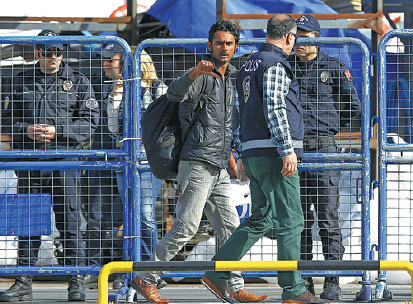First wave of migrants returned to Turkey
EU keeps its side of the pact, with a group of 16 Syrian asylum seekers flying into Germany
Three boats shipped scores of migrants from the Greek islands to Turkey on Monday, the first wave of deportations under a hotly-contested pact to ease Europe's worst migration crisis since World War II.
As the sun rose over the Greek islands of Lesbos and Chios, some 200 migrants, mainly from Pakistan and Bangladesh, were ferried back across the Aegean Sea, retracing the perilous journey they took on rickety boats in their desperation to reach Europe.
European Union officials are hoping the deal with Ankara will discourage migrants from making a trek that has claimed hundreds of lives, and curb a human influx which has put immense pressure on the 28-nation bloc.
Yorgos Kyritsis, the Greek government's migration spokesman, said 136 migrants had left from Lesbos, and 66 from Chios.
"These are migrants who did not request asylum in Greece. The majority were Pakistani. There were two Syrians who did not request asylum for personal reasons," he said.
Police and riot officers were present, but "the procedure was very calm, everything was orderly", EU border agency Frontex spokeswoman Ewa Moncure said.
A few dozen activists on Chios protested against the deportations, chanting "Freedom", a witness said.
"Stop the dirty deal", "stop deportations" and "wake up Europe" were among the banners brandished in Lesbos against the disputed EU-Turkey agreement.
A couple of hours later, the first ferry docked in the Turkish coastal town of Dikili.
Red tents have been set up along the town's harbourside to receive the arrivals.
Mustafa Toprak, governor of Turkey's Izmir region, said the migrants would only be staying briefly in Dikili and the resort of Cesme - a second reception point - before being moved on.
But the deal did not seem to completely deter those hoping to reach Europe, for the Turkish coast guard blocked a boatload of about 60 migrants, mostly Afghans, on Monday morning.
Syrians arrive in Germany
The EU kept its side of the pact, with a group of 16 asylum seekers from Syria flying into Germany, which last year let in a record 1.1 million migrants.
A representative from the Federal Office for Migration and Refugees, who did not give her name, asked reporters to respect the privacy of the asylum seekers, who were members of three families.
"This is all very new, very difficult," she said. "They have been traveling for a very long time."
Several dozen other refugees are expected to arrive in France, Finland and Portugal, according to German government sources.
The huge influx of migrants into the EU is tugging at the bloc by the seams.
The deal clinched in March, driven by German Chancellor Angela Merkel, is seen as a last-ditch effort to overcome the crisis.
Under the terms of the deal, all "irregular migrants" arriving since March 20 face being sent back, although the accord calls for each case to be examined individually.
For every Syrian refugee returned, another will be resettled from Turkey to the EU, with numbers capped at 72,000.
AFP - Reuters
|
A migrant is escorted by a Turkish police officer upon his arrival in the Turkish coastal town of Dikili on Monday. Murad Sezer / Reuters |



















